service CHEVROLET COBALT 2007 1.G Service Manual
[x] Cancel search | Manufacturer: CHEVROLET, Model Year: 2007, Model line: COBALT, Model: CHEVROLET COBALT 2007 1.GPages: 450, PDF Size: 2.48 MB
Page 264 of 450
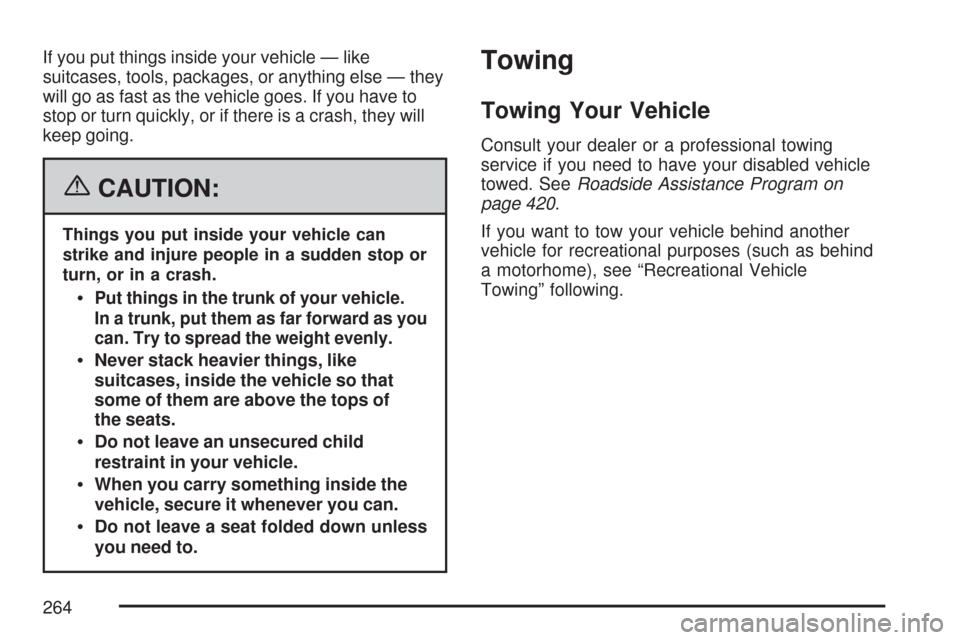
If you put things inside your vehicle — like
suitcases, tools, packages, or anything else — they
will go as fast as the vehicle goes. If you have to
stop or turn quickly, or if there is a crash, they will
keep going.
{CAUTION:
Things you put inside your vehicle can
strike and injure people in a sudden stop or
turn, or in a crash.
Put things in the trunk of your vehicle.
In a trunk, put them as far forward as you
can. Try to spread the weight evenly.
Never stack heavier things, like
suitcases, inside the vehicle so that
some of them are above the tops of
the seats.
Do not leave an unsecured child
restraint in your vehicle.
When you carry something inside the
vehicle, secure it whenever you can.
Do not leave a seat folded down unless
you need to.
Towing
Towing Your Vehicle
Consult your dealer or a professional towing
service if you need to have your disabled vehicle
towed. SeeRoadside Assistance Program on
page 420.
If you want to tow your vehicle behind another
vehicle for recreational purposes (such as behind
a motorhome), see “Recreational Vehicle
Towing” following.
264
Page 276 of 450
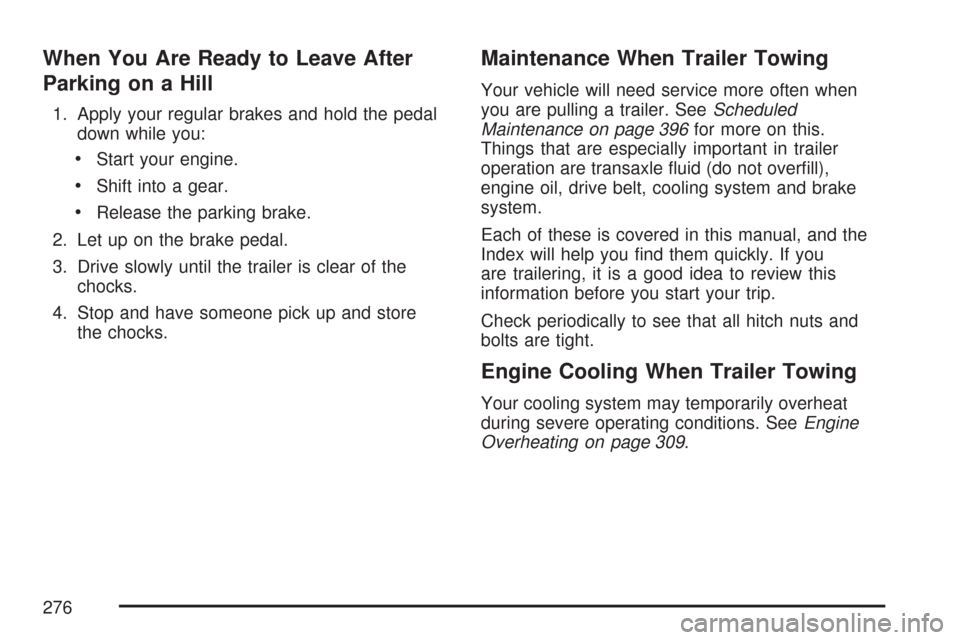
When You Are Ready to Leave After
Parking on a Hill
1. Apply your regular brakes and hold the pedal
down while you:
Start your engine.
Shift into a gear.
Release the parking brake.
2. Let up on the brake pedal.
3. Drive slowly until the trailer is clear of the
chocks.
4. Stop and have someone pick up and store
the chocks.
Maintenance When Trailer Towing
Your vehicle will need service more often when
you are pulling a trailer. SeeScheduled
Maintenance on page 396for more on this.
Things that are especially important in trailer
operation are transaxle �uid (do not over�ll),
engine oil, drive belt, cooling system and brake
system.
Each of these is covered in this manual, and the
Index will help you �nd them quickly. If you
are trailering, it is a good idea to review this
information before you start your trip.
Check periodically to see that all hitch nuts and
bolts are tight.
Engine Cooling When Trailer Towing
Your cooling system may temporarily overheat
during severe operating conditions. SeeEngine
Overheating on page 309.
276
Page 277 of 450
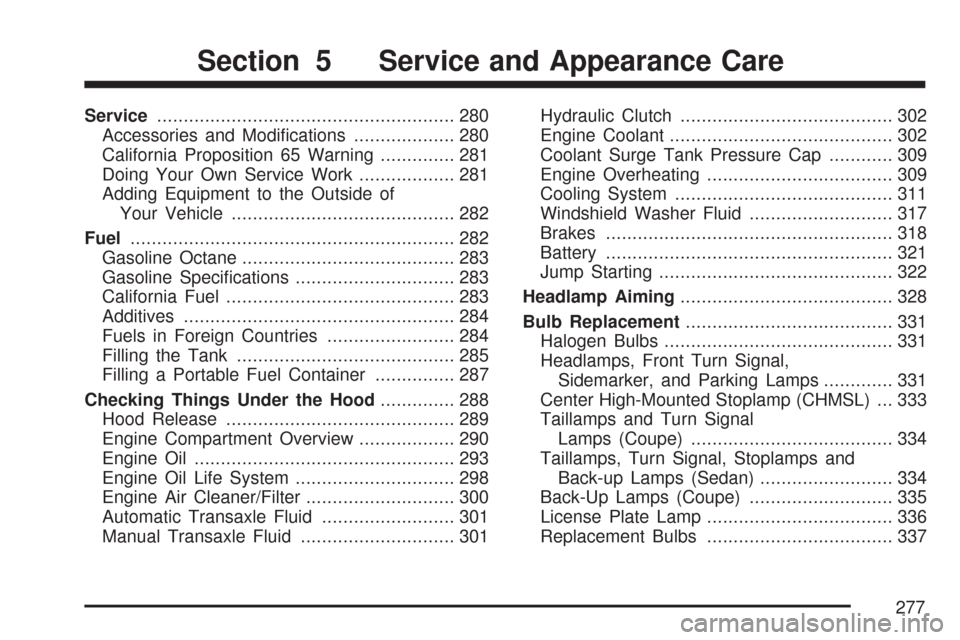
Service........................................................ 280
Accessories and Modi�cations................... 280
California Proposition 65 Warning.............. 281
Doing Your Own Service Work.................. 281
Adding Equipment to the Outside of
Your Vehicle.......................................... 282
Fuel............................................................. 282
Gasoline Octane........................................ 283
Gasoline Speci�cations.............................. 283
California Fuel........................................... 283
Additives................................................... 284
Fuels in Foreign Countries........................ 284
Filling the Tank......................................... 285
Filling a Portable Fuel Container............... 287
Checking Things Under the Hood.............. 288
Hood Release........................................... 289
Engine Compartment Overview.................. 290
Engine Oil................................................. 293
Engine Oil Life System.............................. 298
Engine Air Cleaner/Filter............................ 300
Automatic Transaxle Fluid......................... 301
Manual Transaxle Fluid............................. 301Hydraulic Clutch........................................ 302
Engine Coolant.......................................... 302
Coolant Surge Tank Pressure Cap............ 309
Engine Overheating................................... 309
Cooling System......................................... 311
Windshield Washer Fluid........................... 317
Brakes...................................................... 318
Battery...................................................... 321
Jump Starting............................................ 322
Headlamp Aiming........................................ 328
Bulb Replacement....................................... 331
Halogen Bulbs........................................... 331
Headlamps, Front Turn Signal,
Sidemarker, and Parking Lamps............. 331
Center High-Mounted Stoplamp (CHMSL) ... 333
Taillamps and Turn Signal
Lamps (Coupe)...................................... 334
Taillamps, Turn Signal, Stoplamps and
Back-up Lamps (Sedan)......................... 334
Back-Up Lamps (Coupe)........................... 335
License Plate Lamp................................... 336
Replacement Bulbs................................... 337
Section 5 Service and Appearance Care
277
Page 278 of 450
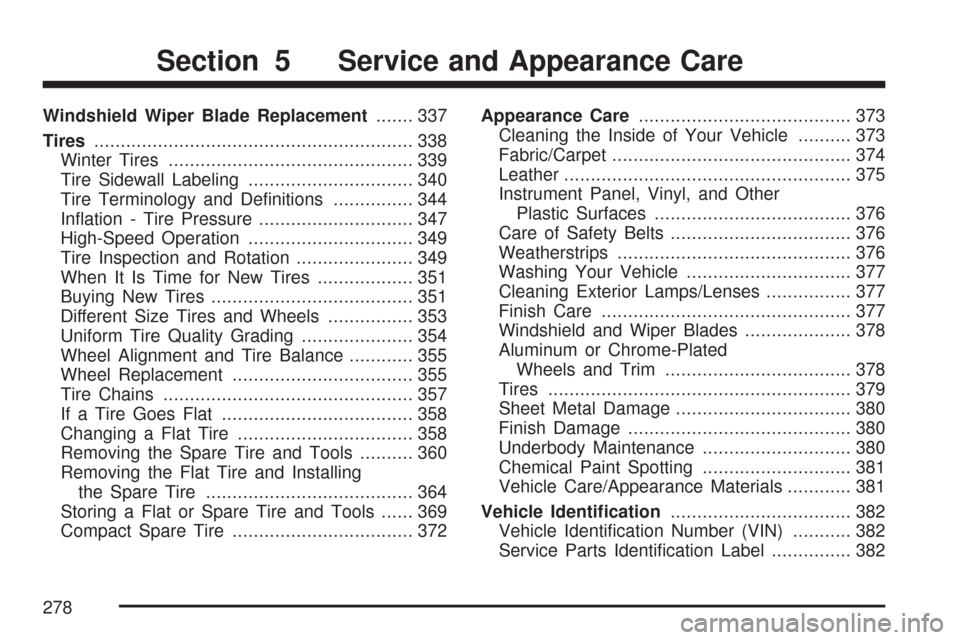
Windshield Wiper Blade Replacement....... 337
Tires............................................................ 338
Winter Tires.............................................. 339
Tire Sidewall Labeling............................... 340
Tire Terminology and De�nitions............... 344
In�ation - Tire Pressure............................. 347
High-Speed Operation............................... 349
Tire Inspection and Rotation...................... 349
When It Is Time for New Tires.................. 351
Buying New Tires...................................... 351
Different Size Tires and Wheels................ 353
Uniform Tire Quality Grading..................... 354
Wheel Alignment and Tire Balance............ 355
Wheel Replacement.................................. 355
Tire Chains............................................... 357
If a Tire Goes Flat.................................... 358
Changing a Flat Tire................................. 358
Removing the Spare Tire and Tools.......... 360
Removing the Flat Tire and Installing
the Spare Tire....................................... 364
Storing a Flat or Spare Tire and Tools...... 369
Compact Spare Tire.................................. 372Appearance Care........................................ 373
Cleaning the Inside of Your Vehicle.......... 373
Fabric/Carpet............................................. 374
Leather...................................................... 375
Instrument Panel, Vinyl, and Other
Plastic Surfaces..................................... 376
Care of Safety Belts.................................. 376
Weatherstrips............................................ 376
Washing Your Vehicle............................... 377
Cleaning Exterior Lamps/Lenses................ 377
Finish Care............................................... 377
Windshield and Wiper Blades.................... 378
Aluminum or Chrome-Plated
Wheels and Trim................................... 378
Tires......................................................... 379
Sheet Metal Damage................................. 380
Finish Damage.......................................... 380
Underbody Maintenance............................ 380
Chemical Paint Spotting............................ 381
Vehicle Care/Appearance Materials............ 381
Vehicle Identi�cation.................................. 382
Vehicle Identi�cation Number (VIN)........... 382
Service Parts Identi�cation Label............... 382
Section 5 Service and Appearance Care
278
Page 279 of 450
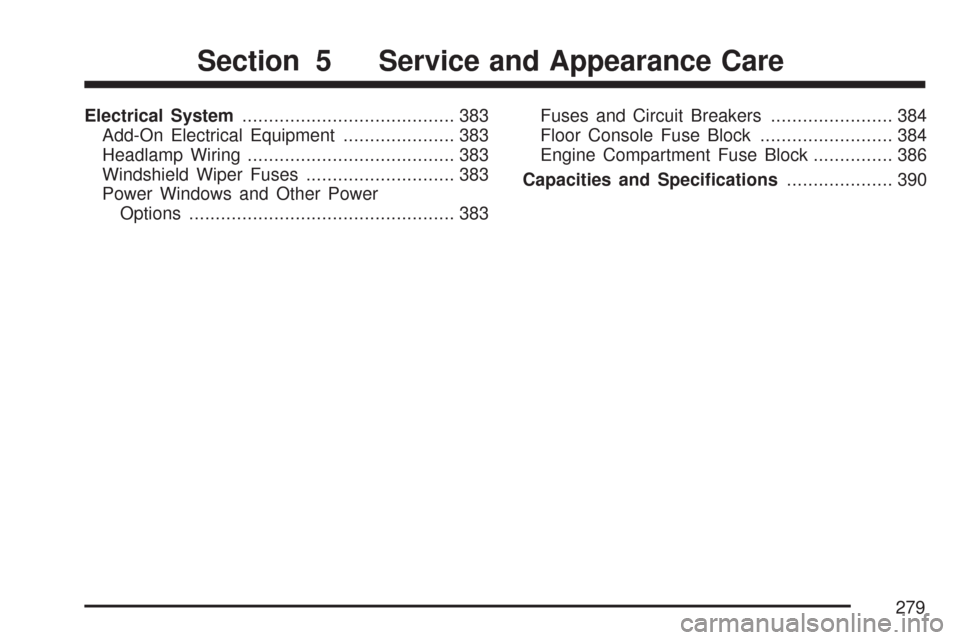
Electrical System........................................ 383
Add-On Electrical Equipment..................... 383
Headlamp Wiring....................................... 383
Windshield Wiper Fuses............................ 383
Power Windows and Other Power
Options.................................................. 383Fuses and Circuit Breakers....................... 384
Floor Console Fuse Block......................... 384
Engine Compartment Fuse Block............... 386
Capacities and Speci�cations.................... 390
Section 5 Service and Appearance Care
279
Page 280 of 450
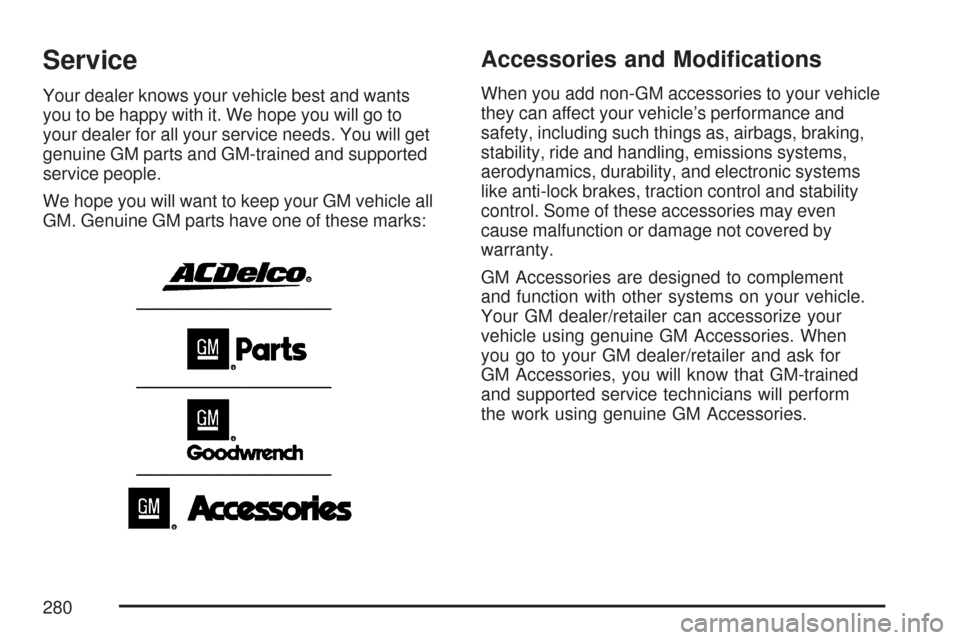
Service
Your dealer knows your vehicle best and wants
you to be happy with it. We hope you will go to
your dealer for all your service needs. You will get
genuine GM parts and GM-trained and supported
service people.
We hope you will want to keep your GM vehicle all
GM. Genuine GM parts have one of these marks:
Accessories and Modi�cations
When you add non-GM accessories to your vehicle
they can affect your vehicle’s performance and
safety, including such things as, airbags, braking,
stability, ride and handling, emissions systems,
aerodynamics, durability, and electronic systems
like anti-lock brakes, traction control and stability
control. Some of these accessories may even
cause malfunction or damage not covered by
warranty.
GM Accessories are designed to complement
and function with other systems on your vehicle.
Your GM dealer/retailer can accessorize your
vehicle using genuine GM Accessories. When
you go to your GM dealer/retailer and ask for
GM Accessories, you will know that GM-trained
and supported service technicians will perform
the work using genuine GM Accessories.
280
Page 281 of 450
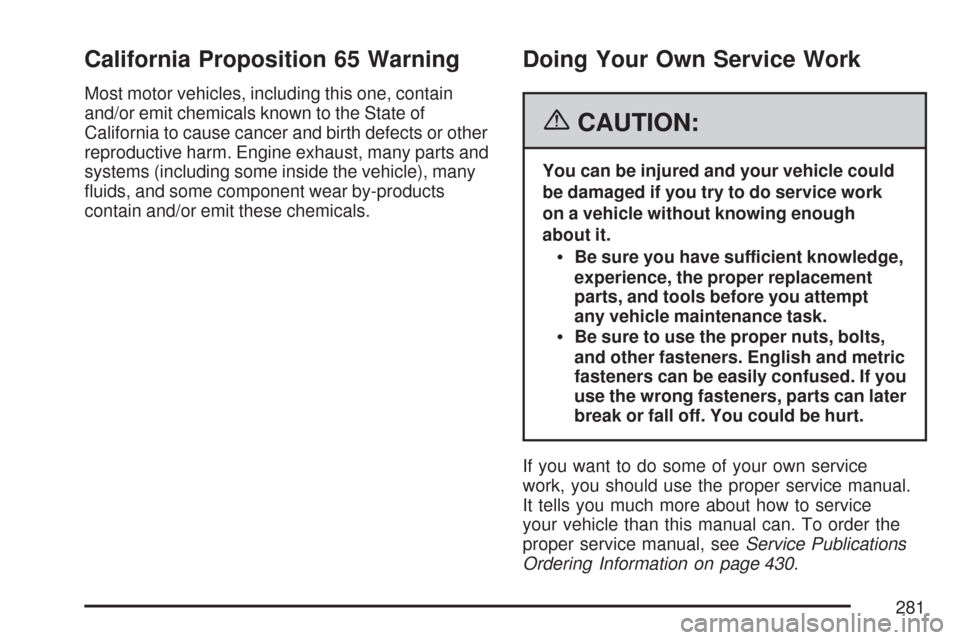
California Proposition 65 Warning
Most motor vehicles, including this one, contain
and/or emit chemicals known to the State of
California to cause cancer and birth defects or other
reproductive harm. Engine exhaust, many parts and
systems (including some inside the vehicle), many
�uids, and some component wear by-products
contain and/or emit these chemicals.
Doing Your Own Service Work
{CAUTION:
You can be injured and your vehicle could
be damaged if you try to do service work
on a vehicle without knowing enough
about it.
Be sure you have sufficient knowledge,
experience, the proper replacement
parts, and tools before you attempt
any vehicle maintenance task.
Be sure to use the proper nuts, bolts,
and other fasteners. English and metric
fasteners can be easily confused. If you
use the wrong fasteners, parts can later
break or fall off. You could be hurt.
If you want to do some of your own service
work, you should use the proper service manual.
It tells you much more about how to service
your vehicle than this manual can. To order the
proper service manual, seeService Publications
Ordering Information on page 430.
281
Page 282 of 450
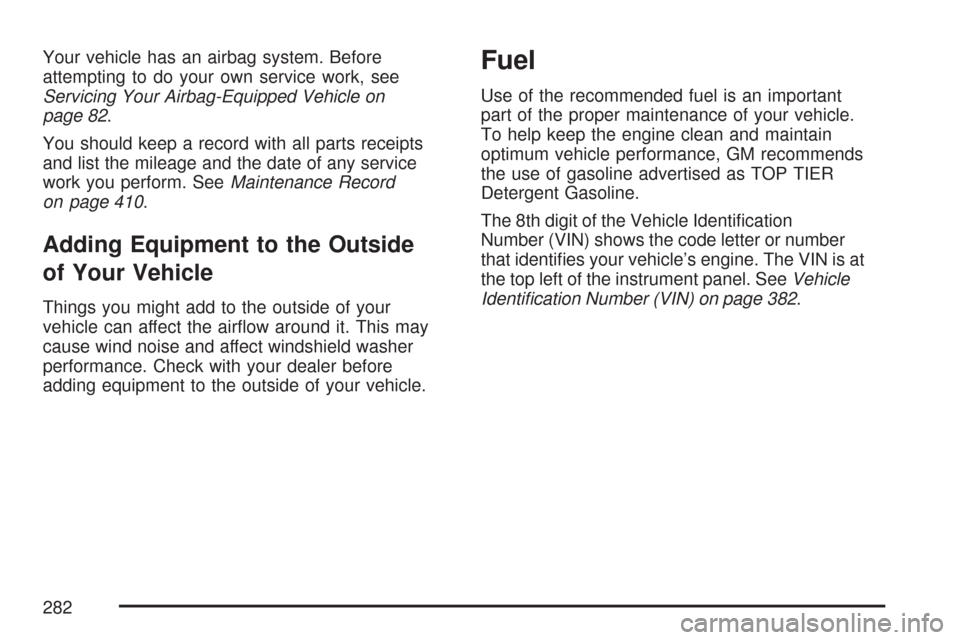
Your vehicle has an airbag system. Before
attempting to do your own service work, see
Servicing Your Airbag-Equipped Vehicle on
page 82.
You should keep a record with all parts receipts
and list the mileage and the date of any service
work you perform. SeeMaintenance Record
on page 410.
Adding Equipment to the Outside
of Your Vehicle
Things you might add to the outside of your
vehicle can affect the air�ow around it. This may
cause wind noise and affect windshield washer
performance. Check with your dealer before
adding equipment to the outside of your vehicle.
Fuel
Use of the recommended fuel is an important
part of the proper maintenance of your vehicle.
To help keep the engine clean and maintain
optimum vehicle performance, GM recommends
the use of gasoline advertised as TOP TIER
Detergent Gasoline.
The 8th digit of the Vehicle Identi�cation
Number (VIN) shows the code letter or number
that identi�es your vehicle’s engine. The VIN is at
the top left of the instrument panel. SeeVehicle
Identi�cation Number (VIN) on page 382.
282
Page 283 of 450
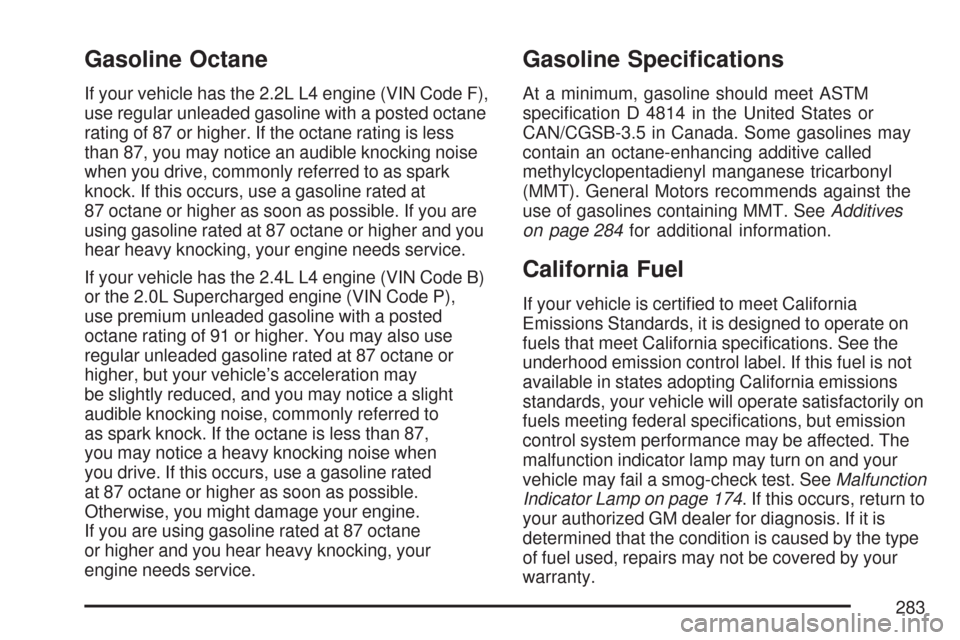
Gasoline Octane
If your vehicle has the 2.2L L4 engine (VIN Code F),
use regular unleaded gasoline with a posted octane
rating of 87 or higher. If the octane rating is less
than 87, you may notice an audible knocking noise
when you drive, commonly referred to as spark
knock. If this occurs, use a gasoline rated at
87 octane or higher as soon as possible. If you are
using gasoline rated at 87 octane or higher and you
hear heavy knocking, your engine needs service.
If your vehicle has the 2.4L L4 engine (VIN Code B)
or the 2.0L Supercharged engine (VIN Code P),
use premium unleaded gasoline with a posted
octane rating of 91 or higher. You may also use
regular unleaded gasoline rated at 87 octane or
higher, but your vehicle’s acceleration may
be slightly reduced, and you may notice a slight
audible knocking noise, commonly referred to
as spark knock. If the octane is less than 87,
you may notice a heavy knocking noise when
you drive. If this occurs, use a gasoline rated
at 87 octane or higher as soon as possible.
Otherwise, you might damage your engine.
If you are using gasoline rated at 87 octane
or higher and you hear heavy knocking, your
engine needs service.
Gasoline Speci�cations
At a minimum, gasoline should meet ASTM
speci�cation D 4814 in the United States or
CAN/CGSB-3.5 in Canada. Some gasolines may
contain an octane-enhancing additive called
methylcyclopentadienyl manganese tricarbonyl
(MMT). General Motors recommends against the
use of gasolines containing MMT. SeeAdditives
on page 284for additional information.
California Fuel
If your vehicle is certi�ed to meet California
Emissions Standards, it is designed to operate on
fuels that meet California speci�cations. See the
underhood emission control label. If this fuel is not
available in states adopting California emissions
standards, your vehicle will operate satisfactorily on
fuels meeting federal speci�cations, but emission
control system performance may be affected. The
malfunction indicator lamp may turn on and your
vehicle may fail a smog-check test. SeeMalfunction
Indicator Lamp on page 174. If this occurs, return to
your authorized GM dealer for diagnosis. If it is
determined that the condition is caused by the type
of fuel used, repairs may not be covered by your
warranty.
283
Page 284 of 450
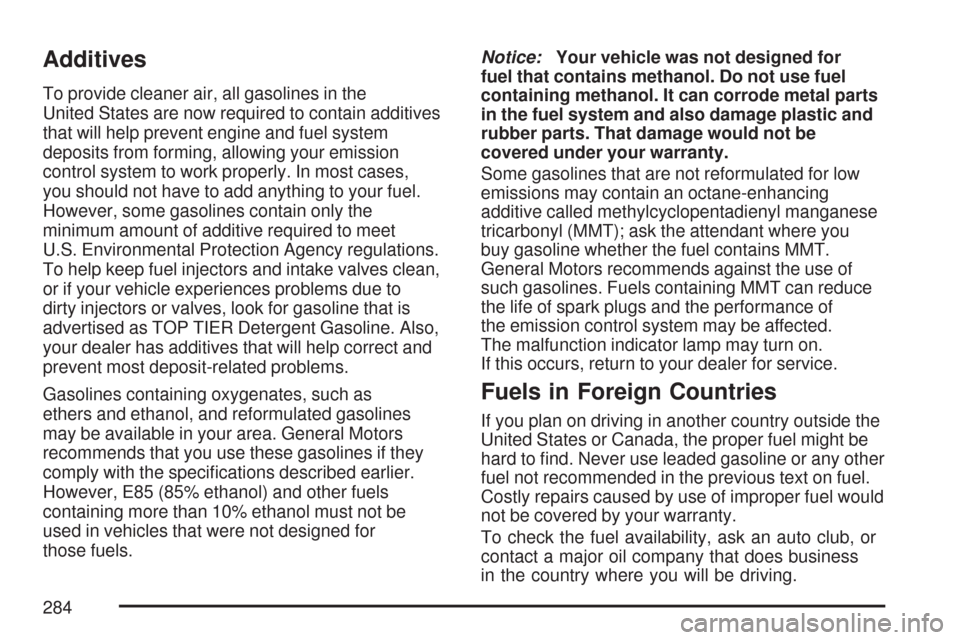
Additives
To provide cleaner air, all gasolines in the
United States are now required to contain additives
that will help prevent engine and fuel system
deposits from forming, allowing your emission
control system to work properly. In most cases,
you should not have to add anything to your fuel.
However, some gasolines contain only the
minimum amount of additive required to meet
U.S. Environmental Protection Agency regulations.
To help keep fuel injectors and intake valves clean,
or if your vehicle experiences problems due to
dirty injectors or valves, look for gasoline that is
advertised as TOP TIER Detergent Gasoline. Also,
your dealer has additives that will help correct and
prevent most deposit-related problems.
Gasolines containing oxygenates, such as
ethers and ethanol, and reformulated gasolines
may be available in your area. General Motors
recommends that you use these gasolines if they
comply with the speci�cations described earlier.
However, E85 (85% ethanol) and other fuels
containing more than 10% ethanol must not be
used in vehicles that were not designed for
those fuels.Notice:Your vehicle was not designed for
fuel that contains methanol. Do not use fuel
containing methanol. It can corrode metal parts
in the fuel system and also damage plastic and
rubber parts. That damage would not be
covered under your warranty.
Some gasolines that are not reformulated for low
emissions may contain an octane-enhancing
additive called methylcyclopentadienyl manganese
tricarbonyl (MMT); ask the attendant where you
buy gasoline whether the fuel contains MMT.
General Motors recommends against the use of
such gasolines. Fuels containing MMT can reduce
the life of spark plugs and the performance of
the emission control system may be affected.
The malfunction indicator lamp may turn on.
If this occurs, return to your dealer for service.
Fuels in Foreign Countries
If you plan on driving in another country outside the
United States or Canada, the proper fuel might be
hard to �nd. Never use leaded gasoline or any other
fuel not recommended in the previous text on fuel.
Costly repairs caused by use of improper fuel would
not be covered by your warranty.
To check the fuel availability, ask an auto club, or
contact a major oil company that does business
in the country where you will be driving.
284